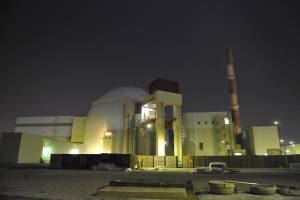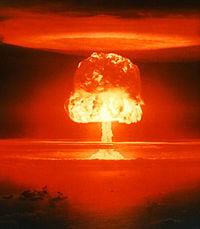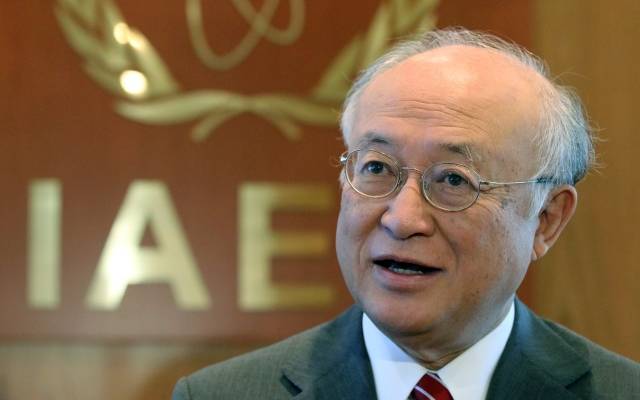Iran and the P5+1 continue to disagree on the facts of the framework deal regarding Tehran’s nuclear program. They are aiming for a final agreement by June 30.

Iran’s nuclear plant in Bushehr. (AP/ISNA, Mehdi Ghasemi)
The P5+1 powers and Iran both report progress in the nuclear negotiations, which are slated to conclude with a final agreement by the end of June. A review of the details of the deal, however, reveals a large difference in opinion between the two sides.
Setting up a potential showdown with Iran, Yukia Amano, head of the UN International Atomic Energy Agency (IAEA), said Tuesday that a nuclear agreement being worked on by Tehran and the six world powers would give his experts the right to push for access to Iranian military sites, but the Iranians categorically deny this.
Iran tentatively agreed last month as part of the negotiations to open its atomic activities to greater scrutiny as part of the deal, but Iranian Supreme Leader Ayatollah Ali Khamenei has since set conditions, declaring military sites off limits “to foreigners … under the pretext of inspections.” Commander of the Revolutionary Guards (IRCG) Brig. Gen. Hossein Salami warned that anyone setting foot into an Iranian military facility will be met with “hot lead” — meaning bullets.
In an Associated Press interview Tuesday, Amano said that Iran specifically agreed to implement what is known as the agency’s “Additional Protocol” when it agreed to the outlines of the deal being negotiated.
The protocol would allow the agency’s inspectors much more access than they have now to follow up on suspicions of undeclared Iranian nuclear activities or equipment.
The United States and Russia are among the more than 100 countries implementing additional protocols, although the US and some others have provisions designed to ensure that inspections do not compromise national security, which is something Iran also demands. Still, Amano said the same rules will apply to Iran as to the others that have signed on.
“In many other countries from time to time we request access to military sites when we have the reason to, so why not Iran?” he said. “If we have a reason to request access, we will do so, and in principle Iran has to accept it.”
Amano said the agency can request access, clarification or a “short-notice inspection” whenever “there is any inconsistency (or) abnormality” to what Iran has declared as its nuclear work or assets.
In arguing that military facilities must be accessible to the agency, the US and others at the negotiating table with Iran point to suspicions that Tehran used them in the past to work on nuclear weapons, which Iran denies.
Tehran claims it has no interest in nuclear arms, but Washington and its allies want to be sure they get complete picture of such activities. The IAEA has conceded that such scrutiny my not be possible in Iran’s case.
A Deal Breaker?
Iran says opening up such sites could lead to spying on its military assets.
Iran’s refusal to allow access to all its suspected nuclear sites could lead to a crisis if the agency tries for access once a deal is struck and Iran turns it down. David Albright of the Institute for Science and International Security says Iranian refusal could even be a deal breaker.
It is also unclear whether the Additional Protocol will aid the agency in kick-starting nearly a decade of stalled investigations of Iran’s nuclear weapons work. Asked if the Additional Protocol will help in the agency’s probe, Amano said “we don’t know yet.”
“We are not in position to provide an assessment now,” he said. Success “depends very much on the pace and level of cooperation from Iran.”
While Iran wants quick sanctions relief, diplomats involved in the negotiations say it cannot hope to be completely sanctions-free until the IAEA delivers a ruling on its nuclear program. Iran has repeatedly refused to allow agency inspectors access to documents, officials and sites in which they are interested.
Responding to Amano’s remarks, Behrouz Kamalvandi, spokesman for the Atomic Energy Organization of Iran (AEOI), said Amano’s remarks were “his own interpretation.”
The Islamic Republic has not approved nor implemented the Additional Protocol yet, Kamalvandi said, adding that in the provisions of the protocol, there is no specific obligation for signatory countries to allow access to their military sites.
By: AP and United with Israel Staff
Sign the Petition to Stop a Nuclear Iran

The US Congress must ensure that sanctions against Iran remain in force until the nuclear threat is completely eliminated.
I strongly oppose easing sanctions before the nuclear threat from Iran has been eliminated. Allowing Iran to enrich uranium without being subject to 'anytime, anywhere' inspections is extremely dangerous and unacceptable. Iran's nuclear program must be stopped.
Send Passover Packages to Needy Israeli Soldiers - Bring Them Joy!
We are honored to thank the young men and women of the IDF who risk their lives every day to protect the citizens of Israel. Since October 7th, soldiers have been on the battlefield for months - many are hoping to come home for Passover.
Join us in sending Passover food packages (and personal notes) to Israeli soldiers and their families.
Many soldiers spend the Passover holiday with needy families back home. The soldiers greatly appreciate your love and concern. Bring them Passover joy!
CLICK HERE TO SEND YOUR PACKAGE AND NOTE TO ISRAELI SOLDIERS!




